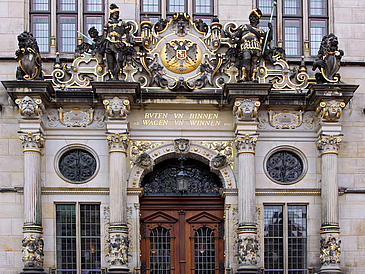Western democracies are constantly confronted with new challenges, because liberal values, manners, and achievements such as the rule of law or freedom of the press are constantly torpedoed by right-wing populist movements but also by left-wing groups critical of globalization. Another social stress factor is the growing economic inequality, which, among other things, leads to the fact that the spheres of life of different social groups strongly diverge from one another.
Erosion of the Middle Class
The dynamics of inequality can also be seen in increasing status competition within social groups. The middle classes in particular are affected by this, as competitive behavior is just as prevalent in education, labor, and financial markets as on digitized dating platforms or in social networks. It is therefore open to debate whether a broad middle class can still yield the long-term integration efforts that were previously taken for granted by Western democracies. The Bremer Universitäts-Gespräche 2018 want to draw attention to these problems and relate them to each other.
Public Event: Can We Still Talk?
The public panel discussion in the Schütting, Bremen, at 6 p.m. on Thursday, November 15, 2018 will be the prelude and thematic introduction to the closed conference with the title “Can We Still Talk? The Drifting Apart of Society and the Crisis of the Public”. People who live in a democracy discuss controversial issues and are used to parties in conflict with one another arguing in an appropriate manner. However, this seems to have become increasingly difficult in recent years. On the one hand, the gap between rich and poor has widened in Germany, not only economically but also in terms of their lifeworld. At the same time, conflicts over values are breaking out, which often go as far as identity-laden conceptions of the self and are therefore often discussed in a highly emotional manner. The public, civil society, and political debate that would arise from this would be fundamentally challenged as the predominant discourse of elites and certain social milieus, which would have long since decoupled themselves from the life situations and environments of large sections of the population.
VIP Panel
How can we come to a common understanding in such an atmosphere? This question will be discussed by SPD member of the Bundestag and former integration commissioner of the Federal Government, Aydan Özoğuz, Professor Wolfgang Merkel, director of the Democracy and Democratization research unit at the Berlin Social Science Center (WZB), and Jürgen Kaube, co-editor of the Frankfurter Allgemeine Zeitung. Stephanie Rohde, editor at WDR and Deutschlandfunk, will moderate the event. Singer and songwriter Katharina Franck will provide musical entertainment.
The Bremer Universitäts-Gespräche conference
Since 1988, the Wolfgang-Ritter-Stiftung (Wolfgang Ritter foundation), the University of Bremen, and the “unifreunde” association have been inviting students to the Bremer Universitäts-Gespräche conference. The aim is to stimulate a dialogue on topical issues with social partners beyond the scientific framework. A lively exchange of representatives from science, politics, and business can give the discussion new impetus and practical relevance.
The Bremer Universitäts-Gespräche conference will take place this year for the 31st time. The talks will be financed by the Wolfgang-Ritter-Stiftung. The scientific coordination is overseen by Professor Olaf Groh-Samberg and Professor Martin Nonhoff from the University of Bremen and the Bremen International Graduate School of Social Sciences (BIGSSS), a joint institution of the University of Bremen and Jacobs University. The opening event in the Schütting at 6 p.m. on November 15, 2018 is open to the public. Participation in the conference on November 16, 2018 is by invitation only.
Additional Information:
www.uni-bremen.de/bug/
www.uni-bremen.de/fileadmin/user_upload/sites/bug/Downloads/BUG_148983_programmheft_2018_de.pdf
www.uni-bremen.de
Contact:
Dr. Christina Jung
UniTransfer – Sponsors and Partners
University of Bremen
Tel.: +49 421 218-60336
E-mail: christina.jungprotect me ?!vw.uni-bremenprotect me ?!.de

